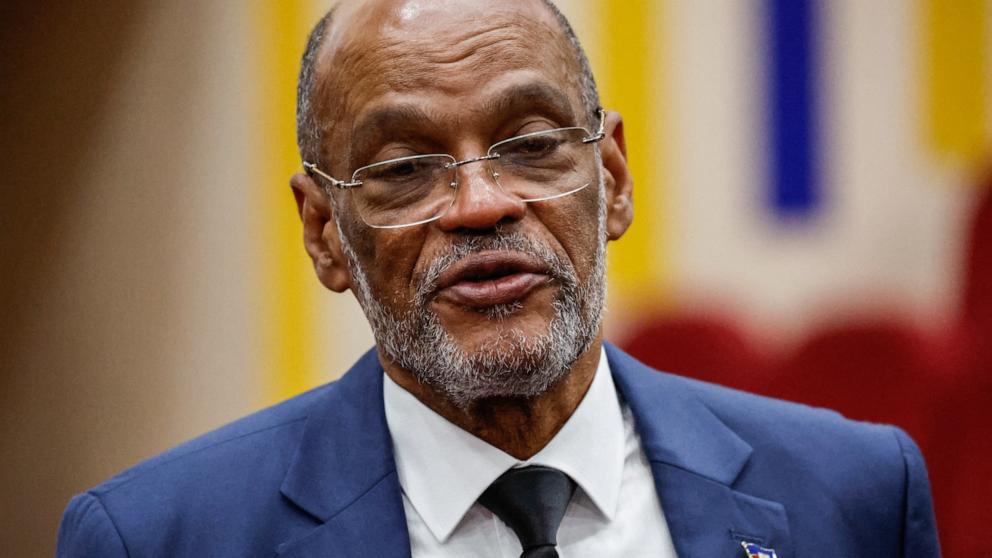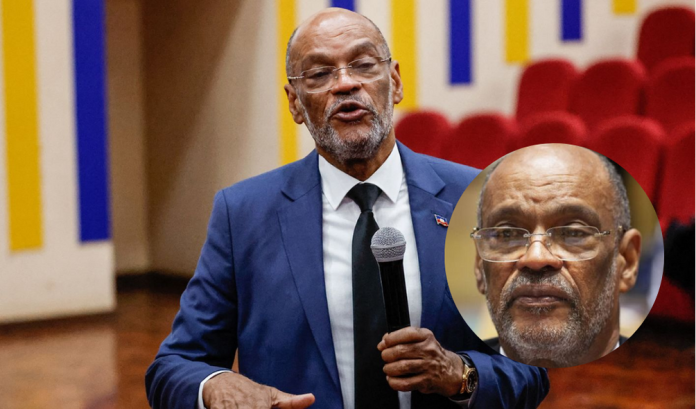Amidst a severe crisis exacerbated by widespread gang violence, Haiti’s Prime Minister Ariel Henry has stepped down, signaling a crucial shift in the nation’s political dynamics. This resignation follows intense turmoil, with gangs assaulting governmental foundations and pushing societal structures to the edge of disintegration. Henry’s departure is a direct consequence of increasing demands from domestic and international entities, including the United States, the Caribbean Community and Common Market (CARICOM), and the Haitian public.
In a video broadcast, Henry outlined his intention to ensure Haiti’s stability and peace, announcing that his administration would serve in a caretaker capacity until the formation of a new interim government. He highlighted the importance of establishing a transitional council to prepare the groundwork for upcoming elections, marking a critical move towards re-establishing order and governance in Haiti.
The reaction to Henry’s resignation has been ambivalent. While it signifies an effort to tackle the immediate turmoil and pave the way for a peaceful power transition, it also prompts speculation about Haiti’s future leadership and the extent of foreign involvement in its governance.

Recent developments, including the gang-led liberation of prison inmates, assaults on state buildings, and Henry’s own security-related inability to return to Haiti, have precipitated a dire humanitarian situation, driving thousands from their homes.
International backing has been pivotal during this crisis. The United States has committed $300 million to support a Kenyan-led international security mission, alongside an additional $33 million for humanitarian aid. Furthermore, CARICOM, during its assembly in Jamaica, resolved to establish a transitional council to aid in a smooth power transition and ensure governance continuity.
Henry’s resignation and the initiation of a transitional council are viewed as vital steps towards stabilizing Haiti’s precarious situation. Nevertheless, the road ahead remains fraught with uncertainty, with lingering questions about who will lead the nation forward and how peace and order will be reinstated.
This momentous episode in Haiti’s history underscores the profound challenges the country confronts in overcoming its present crisis. The formation of a transitional council, coupled with international assistance, are deemed essential for reinstating governance and security in Haiti.
Also Read | The Crime Education Statistics in Schools – Role of the School in Educating Students about Crime
How has the international community responded to the crisis in Haiti?
The global response to the unfolding crisis in Haiti has been comprehensive, targeting immediate relief needs as well as striving for enduring stability. The United Nations Security Council (UNSC) has been central to these efforts, green-lighting a Kenya-led Multinational Security Support mission in October 2023 to tackle the rising disorder and violence. This initiative aims to bolster the Haitian Police’s capacity to fight gang aggression and stem illegal weapons trade. Nonetheless, the mission’s rollout has encountered hurdles, including a legal contestation in Kenya’s High Court, underscoring the intricate nature of international aid in Haiti.
Human Rights Watch (HRW) has advocated for a response anchored in human rights, underscoring the critical requirement for support amidst increasing instances of violence, abductions, sexual assaults, and a dire food shortage. The organization stresses the necessity of resolving Haiti’s political stalemate and holding accountable the leaders and sponsors of criminal factions. HRW has urged the UN to take decisive steps to halt arms supplies to these gangs and assist in the recovery of devastated communities.
The international community, led by countries such as the United States, has contributed significantly to Haiti, allocating over $5 billion towards disaster risk reduction and various projects aimed at fortifying Haiti’s national police, enhancing health and educational services, and improving infrastructure. The U.S. has also supported the UN’s MINUSTAH mission, reflecting a sustained international commitment to Haiti’s crises.

Additionally, the UNSC has renewed the mandate for the UN’s Integrated Office in Haiti (BINUH), underscoring ongoing efforts to combat armed gangs that impede humanitarian work and limit access to essentials. The Secretary-General has solicited strategies to counter these gangs, including amplified training and resources for the Haitian National Police and increased measures against illegal arms trafficking. These initiatives form a comprehensive approach to tackle the foundational issues of the crisis, such as political turmoil and socio-economic hardships.
The international efforts to address the crisis in Haiti represent a dual focus on providing immediate humanitarian aid and fostering long-term stability. The UNSC’s sanctioning of a security mission, HRW’s emphasis on a human rights-centered approach, and substantial aid from the United States and others demonstrate a concerted effort to navigate the challenges Haiti faces. The success of these endeavors hinges on effective execution of the proposed strategies and breaking the cycle of violence and instability plaguing the nation.
Also Read: Arsenal’s Gabriel Martinelli Withdraws From Brazil National Squad
What specific actions has the United States taken in response to the crisis in Haiti?
The United States has taken a comprehensive approach to address the crisis in Haiti, focusing on both immediate humanitarian aid and long-term development and institution-building. Here are the specific actions the U.S. has taken:
- Humanitarian Assistance: The U.S. is the single largest donor of humanitarian assistance to Haiti, providing support for health care, shelter, food, nutrition, water/sanitation, and other relief to meet the needs of the most vulnerable Haitians. This assistance has been crucial in alleviating some of the urgent needs in the country.
- Long-term Development and Institution Building: The U.S. has prioritized support for economic growth, poverty reduction, improved healthcare, and food security. It has also focused on strengthening democratic institutions, the Haitian National Police (HNP), and fostering long-term stability. The U.S. facilitates bilateral trade and investment in Haiti to combat poverty and unemployment, leveraging the large Haitian diaspora in the United States as a potential ally.
- Healthcare and Infrastructure: U.S. assistance has significantly increased access to basic healthcare through 165 hospitals and clinics across Haiti, reaching over 4 million of the most vulnerable. Health infrastructure has been strengthened, including the establishment of a national public health reference laboratory and an early warning surveillance system. The U.S. has also supported the Field Epidemiology Training Program (FETP) for over 10 years, providing training for public health leaders and frontline workers.
- Economic Support: The U.S. has helped over 40 partner financial institutions disburse over $100 million in loans to over 50,000 micro, small, and medium enterprises (MSMEs), generating $110 million in sales. In the agricultural sector, U.S. assistance has helped 105,000 farmers increase crop yields, generating nearly $30 million in agricultural sales and $15 million in private sector investments.
- Water Supply and Sanitation: U.S. assistance, in conjunction with the National Potable Water and Sanitation Directorate (DINEPA), has increased access to water services to over 300,000 Haitians since 2018. This includes provision of fuel to DINEPA water treatment and pumping sites and capacity building for local water distributors.
- Strengthening the Haitian National Police: The U.S. has helped increase the HNP to roughly 14,000 officers from less than 10,000 in 2010. It has also contributed to the construction of six police commissariats and the establishment of a community policing unit to improve community relations and public trust.
- Solar Energy Program: The U.S. government contributed funding towards a solar energy program for the construction of two solar power plants in northern Haiti, aiming to provide sustainable and affordable renewable energy.
- Preventing Conflict and Promoting Stability: Under the U.S. Strategy to Prevent Conflict and Promote Stability, the U.S. will implement a 10-year plan that prioritizes partnering with Haiti to address drivers of instability and conflict. This includes fostering stability in severely affected communities and gradually addressing underlying drivers of conflict, instability, and violence.
- Support for Judicial Reform: The U.S. provided technical assistance to the Superior Judiciary Council (CSPJ) for the vetting of judges and prosecutors, helping renew accountability in the justice sector. It also supported the installation of a digitized Case Management Information System (CMIS) to improve transparency and accountability in the court system.
- Investment in Infrastructure and Business: The U.S. has supported the development and trade of raw and processed agricultural products, medical supplies and equipment, and the modernization of Haiti’s infrastructure. It has also facilitated opportunities for U.S. businesses in Haiti, including light manufacturing, agribusiness, medical supplies, and infrastructure development.
These actions reflect the U.S.’s commitment to addressing the root causes of Haiti’s crisis, focusing on both immediate relief and long-term development to foster a stable, prosperous, and democratic Haiti.
Don’t miss | Was 13 Year Old Byron Dennis Jr Arrested For Shooting? Find Out Here!

